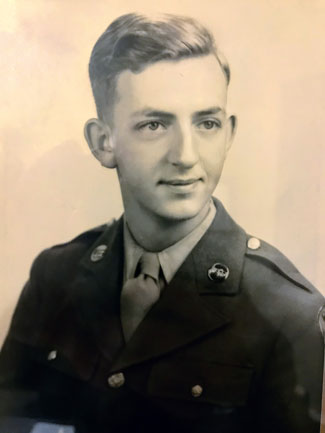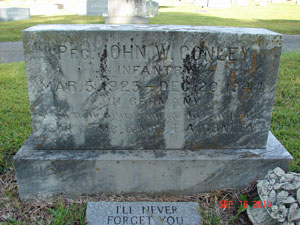
134th Infantry Regiment Website
"All Hell Can't Stop Us"

 |
134th Infantry Regiment Website"All Hell Can't Stop Us" |
 |

Pfc John W. Conley served as an anti-tank gun crewman in the First Platoon of the Anti-Tank Company. He was with the 134th Infantry in May 1944 when they were staged at Camp Kilmer NJ before departing from NY aboard the troop transport USS General A.E. Anderson. The Regiment arrived in Bristol England on May 25, 1944 and they were billeted in Cornwall until they sailed across the English Channel for France. According to Morning Reports the Anti-Tank Company landed on Omaha Beach at 10:30 in the morning on July 6, 1944.
During July they fought in the Normandy hedgerows in the battle for St. Lo, France. In August the Germans launched a major counter-attack at Mortain which the 35th Infantry Division helped to repel. They continued their drive across France and later in August fought in the vicinity of Montargis - Joignay. On September 15 they liberated Nancy. At the time of his death, December 20, 1944, the 134th Infantry had fought its way across the Blies River into Germany and was fighting in the vicinity of Habkirchen where Pfc. Conley was killed by an incoming artillery shell.
Three months prior to his death, during the liberation of Nancy, Pfc. Conley befriended a 16-year-old French boy, Jean Morel. At that time John Conley was only 19 years old, the youngest member of an anti-tank crew stationed near his house. Mr. Morel visited the United States in 1985 to pay tribute to John. The following article describing that visit appeared in Good Housekeeping Magazine.
In Search of a Friend - Good Housekeeping Magazine - 2000 |
| In June of 1985, I visited my cousin,
Susan, in Wilmington, NC. Her mother, my Aunt Sara, had recently moved
from Chattanooga, TN to Wilmington because of health problems and
failing eyesight. I had been there only a short time when my aunt said,
"Tell Donna about the Frenchman." In March 1985, Sara had responded to a knock at the door, finding a man she had never seen before, asking about her brother John, in heavily accented English. John Conley had been killed in the vicinity of Folpersviller, France on December 20, 1944. He was just 19 years old and the only son of my grandparent's five children (my mother, Mildred, who died in 1967, was one of John's sisters). The stress of my Aunt Sara's failing health and eyesight had taken its toll and she became very upset and asked the man to leave. The next day, he phoned her and got the same results. A few days later, she received the following letter: |
| Dear Mrs. Smith: I have now returned to my hometown, Nancy, in northeastern France, after spending almost two weeks in Chattanooga. The reason I came to Chattanooga was to pay a tribute to the memory of someone who has been dear to my heart ever since I met him very shortly and very long ago, indeed. It's your brother, John, I'm referring to, and I would like to explain to you my story. It may seem very old, but to me it's not a matter of time, as I keep in my memory the very fresh souvenir of John, his face enlightened with sweet smiles and full of kindness. We met for the first time on the 15th of September, 1944 when the soldiers of the Third U.S. Army of General Patton liberated Nancy. We had been occupied by the Germans during four long years of starvation and fear, and this day of liberation meant the end of our sufferings and the beginning of our hope for a better life. To us, American soldiers were like Angels delivering us from Hell. John was stationed in the front of my house with a group of five or six other soldiers. They stayed for three or four days before leaving and going further toward Germany. I was a little over 16 then, and John was also very young. He was so nice to us little Frenchmen, teaching us English words from his phrase book, and we enjoyed his company so much. We kept surrounding him all the time, always wanting to talk with him. The other soldiers didn't seem to mind. John was the youngest of them all, and these days were made of joy and friendship. Although it was a very short period, each moment was so full of happiness, it seemed time had ceased to move. When John left, he had promised to come back if he could. And he left me his address, both civilian and military. He also gave me a picture, taken in front of his house with his Dad and brother-in-law in Chattanooga. And John came back! About a month after - he didn't stay very long - two or three hours. He told us the German troops were fighting very hard and that some of the G.I.s who were with him in front of our house had been injured or lost their lives in the fierce combat. I accompanied him back to the truck station, and he left after I promised I would write him. He also told me he would write me after the war was over, when he would be back home in America. And then he left. I never knew what became of him after that. I was supposed to write but did not master English very much at that time. I prepared a letter but did not send it. I was afraid it was not well-written. I still have it - and when I looked at it, it reminded me of John. And time passed by, and I was wondering what became of him. I retired when I was 60, and being that I could travel and go to Chattanooga, I began to save money for the trip. I am not a rich man, but my pension rate is not bad by French standards, as I have worked many years. I decided to find out about John; he was only three years older than myself, and I thought that even though so many years had passed by, he would like to meet me. Perhaps he had forgotten all about our encounter. But it did not really matter, as the simple fact of seeing him and talking with him would be one of the greatest joys I could imagine in my life. And I decided to search for him. I learned from the Chattanooga City Hall that no one with the name of Conley was living anymore at 500 Wells Street. They advised me to write to the Veterans Association in Chattanooga. I called there and they told me I should check with the Department of Veterans Affairs in Nashville. I wrote in June and received the bad news in October in a letter stating that John was deceased on December 20, 1944. I felt miserable. With the help of the Veterans Center, I found at the Chattanooga Public Library the obituary published in the newspaper. I learned that John was killed not very long after I left him at the truck station in 1944. I don't remember the date, but I could see John as clearly as if it had been only yesterday. Thanks to the wonderful people in the Veterans Center who located John's grave in Rock Spring Cemetery in Georgia, I was able to make this journey and go to this little space of land where John is resting now, close to his mother and Dad. I was very moved when I read the inscription on the stone: "Died that others might live in peace", and I thought how much in debt I was for what he had done. Coming to his grave was the least I could do. I wanted to see the place where John had spent his life before he came to France - and with the help of my friend (who invited me to stay at his home) we went to Wells Street. People told me that the house had burned and that a sister of John's was living close by on Forrest Ave. I decided to try to see you and express all the sympathy, all the respect I felt for the family of John. And it would have been so dear to my heart to know about John's life. But it was quite unexpected for you. And now I understand how you felt, being disturbed in your sleep and not knowing what the matter was about - with a man telling a story of the past, very long ago, over 50 years back. But you see, to me it was very important. I apologize for creating some troubles in your life. I called you afterward and again it was very disturbing for you. I am going to leave you now, hoping you will understand how I feel and ready to give you any further information you would deem necessary about myself. I wish you, with all my heart, health and happiness, very heartedly, your friend. Jean Morel |
| After returning to Michigan I wrote Jean
a letter telling him about my Uncle John and enclosed a few snapshots.
John Conley was buried in France - a white cross marking his grave. In
1948 his parents, Thomas and Maude Conley, brought their only son home
to be buried in Rock Springs, GA. My grandmother wore her Silver Star on
her clothing for the rest of her life. Jean was able to return to the United States in March 1997, and visited in Wilmington with Susan and Sara. I traveled from Michigan to meet him. We are still corresponding. |

Thanks to Justin Vickers for the photo and magazine article about his great-uncle.